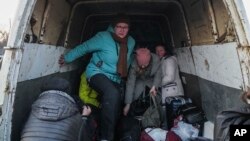The International Committee of the Red Cross reports a misinformation and disinformation campaign is being waged on social media to discredit its humanitarian work in Ukraine.
The Swiss-based organization warns the humanitarian crisis in Ukraine is deepening. It finds the level of death, destruction and suffering inflicted upon the civilian population since Russia invaded the country February 24 abhorrent and unacceptable.
Relentless bombing of the port city of Mariupol has demolished civilian homes and infrastructure. It has displaced tens of thousands of people, depriving them of food, water, and medical care.
Spokesman for the International Committee of the Red Cross Ewan Watson said civilians in Mariupol and other frontline areas are making life and death decisions to flee when there is no agreement that would allow them to leave safely.
He said a surge of misinformation and disinformation is jeopardizing ICRC efforts to protect and distribute humanitarian aid to people trapped by conflict.
“We are seeing deliberate targeted attacks using false narratives and disinformation to discredit the ICRC. And this has the potential to cause real harm for our teams and our Red Cross, Red Crescent movement partners working on the ground and for the people we serve,” he said.
Watson said a huge flow of misinformation and disinformation is being orchestrated across social media channels targeting the ICRC. For example, one claim that has no basis in truth, he said is the agency’s alleged role in forced evacuations.
“The ICRC has not been involved with any forced evacuation, forced transfers of civilians into Russia from Mariupol or any other Ukrainian city…The ICRC does not want to open an office in southern Russia to filter Ukrainians as many reports are alleging. So, that is absolutely false. We are not opening a refugee camp or any other type of camp,” said the spokesman for the ICRC.
Watson said the ICRC operates on the basis of impartiality and neutrality. He said it expects the warring parties to fulfill their obligations under International Humanitarian Law to protect civilians and limit military operations to exclusively military objectives.









